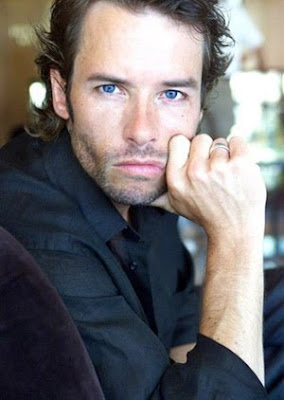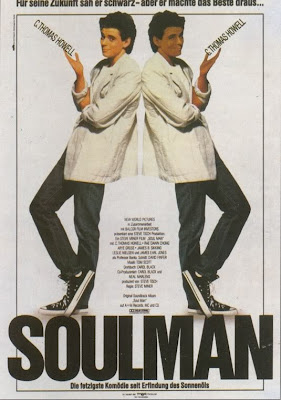Man oh man, to quote “Big Fan,” that’s the last time I ever trust Hawaiians with my pizza. Yesterday’s ham and pineapple surprise has left me swimming and sniffing in a murky haze. So I’ll keep this nice and short. Roger’s going to review The Gunslinger today. Later in the week I have 2010’s first writer interview. There’s also a script I wasn’t liking when I started but somehow it came back from the dead with a vengeance (hey! staying with today’s theme – see below). I also have a script review of an upcoming release whose recent trailers have left fanboys giddy with anticipation (no, it’s not Inception – I’m fairly sure Nolan has snipers perched across the street for if I ever post a review of that script). There’s another review I’m doing for a script that I can’t remember at the moment. That can’t be a good thing. Oh! And we may finally get to post Roger’s review of Book of Eli again, since it’ll be coming out on Friday. As always, here’s Roger with his Monday review...
Genre: Western, Action
Premise: When a Texas Ranger is horrifically tortured and killed, his sharp-shooter older brother, Sam Lee Hensley, plots revenge against the mysterious, sadistic leader of a notorious drug cartel. Sam Lee’s quest for vengeance will cost him seven years in prison, his right hand and one eye. It will imperil his young nephew and wreak havoc on the lives of those who love him. And it will not bring him peace.
About: Nabbed by Warner Brothers with Andrew Lazar (Jonah Hex, Akira) producing through his Mad Chance banner. This is the first feature spec sale for Hlavin, who was once an assistant to Nick Thiel, show-runner of NBC’s Lax. The Gunslinger finished as the 9th highest rated screenplay on the 2009 Black List with 21 votes.
Writer: John Hlavin

Was it wrong of me to think of Roland and The Dark Tower when I first saw this title on the Black List? Was this the first portion of the adaptation by JJ Abrams, Damon Lindelof and Carlton Cuse?
He’s the fucking gunslinger! Let him come to the antagonists, not the other way around. In Death Wish and Dirty Harry, Kersey and Callahan always pursued their victims, no matter how dangerous these villains were. Hell, Harry had the balls to confront robbers with an empty gun. Granted, Sam Lee is injured, but he’s a Texan. Unless it’s The Alamo, Texans are the de facto aggressors, not the guys in hiding.
[ ] What the hell did I just read?
[ ] wasn’t for me
[x] worth the read
[ ] impressive
[ ] genius
What I learned: “The Gunslinger” has some complicated backstory we have to catch up with. It’s not Byzantine or anything, but I think, as screenwriters, we have to be careful molding our character motivations and our narrative events. There’s a type of Complicated a screenwriter can hit that seems to convolute a story. Unlike television, a feature can’t always devote the necessary time to properly tell (but by tell I mean show) a backstory. Brevity and clarity are required. With limited screen-time, the tendency is for a writer to just try and tell an audience the necessary details. The only problem is, showing is more powerful than telling. When it comes to correlating Point A with Point B in a narrative, you want to make the connection as clear and direct as possible. Subtlety may seem complicated, but an audience catches those subtle moments if they’re paying attention. Subtlety is sometimes best left to the actors. Build an easy-to-follow roadmap for your audience so they can feel the story without having to think too much about it. In short? Simplify your conflict.
Are you plugged into the creative heartbeat of Tinseltown? Do you know which hot new writer just got signed by CAA? Or which writer just landed the juiciest assignment in town? Are you up to date on the development of all the big pictures out there (i.e. Is the latest draft of Green Hornet, turned in last week, any good?). Are you someone who can express this kind of information in an interesting entertaining way? I’m looking to *maybe* start a weekly “creative correspondent” segment, but because of other duties, I don’t have time to do it myself. If you meet the above qualifications and this interests you, please e-mail me at carsonreeves1@gmail.com. There’d be no pay to start (I don’t even get paid dammit!) but potential to make something down the line.
Hmm, some complications resulted in me having to take the “Hungry Rabbit Jumps” (Nicolas Cage and January Jones to star – 5 votes on this year’s black list) review down. In short, I liked it. I’ll work on seeing if I can get it back up. In the meantime, here’s everyone’s favorite incredibly modest but painfully beautiful reviewer , Erica (she reviewed an earlier draft of Black List script “Swingles” here), coming to rescue me. She’s reviewing a tiny script aimed at the “A Walk To Remember” crowd.
Genre: Drama
Premise: After a diving accident, a 16-year-old girl enters a coma for five years. When she comes out of her extended stupor, she finds a crumbling family, but is armed with wisdom and knowledge.
About: Emma Roberts was set to star and Anna Sophia Robb to co-star in this film but the project is not listed anywhere so I’m wondering if it’s fallen apart. Someone will have to revive it if we are to ever see Julia Roberts’ neice in the role.
Writers: Charlie Craig with revisions by Liz W. Garcia and Lisa Barrett.
I had the urge to stop and check my twitter feed every few pages of this because it’s a story about a wholesome teen girl, presumably aimed at The Sisterhood of the Traveling Pants set, a demo I would not fall into at this stage of my life. Or ever. I was never the peppy teen who would, like, try out for stuff. I was the girl who turned down offers to go to the prom three years in a row because I thought the concept of prom was bogus. My favorite teen movie? Carrie.
But that is why I was happy to do this review. It forced me to adjust my cynical lens (or at least try to) to examine how something like this is done. And I felt like I learned (a small technical) something on the first page of this script, literally first scene.
The setting is early morning Nashville at Hennessy Lake. The main character, Bryce Graham, a 16 year old athlete in her prime, appears out of the fog but I wasn’t sure at first if she was … rowing or swimming? Her father is standing on the “prow of a Boston whaler” so I’m picturing her swimming and Dad in a boat, right? Or is she rowing and they’re both in the boat? Only after googling “Boston whaler” (which I only did because I knew I was reviewing this) did I realize that was not the type of boat in which you could row. I vaguely understood that the “prow” was either the front or back but didn’t know which (it’s the front), so my visual on this whole opening scenario was very poor. By the last paragraph it says her arms are “slicing through the water” but throwing a “swim” in there somewhere, or calling her a swimmer instead of athlete, would have made life much easier. Especially since this is the first I’m meeting this chick, I haven’t acclimated myself to this world and in the very next scene, she IS on a rowing machine indoors.
The reason this really struck me is because I’m a novelist and a lot of my script edits are of the “arms slicing through water swims” variety. It’s like a bad habit I’m always trying to kick. I also notice that sometimes a character or scene can be so clear in my mind’s eye that I don’t put some very basic information on the page that the person who knows nothing about the script needs to read. And that’s what I felt happened here. In trying to be evocative, they didn’t lose me at hello but they had me wondering if I had missed my exit. (Or if I was a total idiot, not a good feeling going into this.)
But this same evocative writing drew me in as Bryce rushes off to her high school swim meet, with her proud parents and smart alecky kid sister in tow, then winds up banging her head on the diving board and sinking to the bottom of the pool, blood swirling around her. Bummer.
By page 8, she’s unconscious in the hospital, getting an emergency head shaving, and since we know she’s the star of this show, it’s clear that she’s going to survive but first she’s in for a really, really long nap.
Aaaaaand five years later…
Kid sister, Sydney, is a blue-haired, boundary-testing 17 yr. old, Dad is sleeping in the barn where he used to train his athletically-gifted daughter and Mom is still trying to remain upbeat though shit is clearly not right up in the Graham house. On one of Mom and Dad’s regular visits to the hospital we meet Carter Lynch, a 20-something resident who has the time and the inclination to entertain the comatose patients by playing music or reading Danielle Steele to them. Yes, he really does this. His too saintly-to-not-be-annoying behavior and one-way banter (those comatose patients, not great conversationalists) had me rolling my eyes but I was only on page 17 (OMG, there’s 100 more pages of this?) so I kept rolling with it.
Maybe I’m too hardened by life to connect with “heart monitors beeping softly” or maybe I’m just too impatient to let a story unfold in due course but I was actually hoping a madman would break into the hospital, take Carter hostage and shoot up the place. That didn’t happen.
What did happen: Bryce suddenly wakes up. To the shock and jubilation of the medical staff, her parents and kid sister who is the recipient of Bryce’s first words in half a decade: “You’re…old?”
I liked how they describe her first moments of consciousness after she asks to be alone in her hospital room: the sound of a plane flying overhead makes her duck, a woman scolding her child in a park across the street sounds like screaming in her ears, the sun burning through her retinas. This is where I started to develop a mild interest in knowing what was going to happen next though I was still hoping Carter would have a freak diving accident and spend the next five years in her old bed, listening to an endless loop of Lil Weezy like I had to do when my boyfriend drove me to a book signing in Connecticut last week.
Soon Bryce is up and about, walking tentatively in the physical therapy room, a fascination to the doctors and a ray of hope for the visitors whose loved ones are still unconscious. And now she…knows things she can’t possibly know.
Even though the doctors want to keep her in the hospital for observation, she demands to go home where she mostly hangs with her sister, a bug freak whose cicadas literally accompany her everyfuckingwhere. Though the Graham house doesn’t feel like the homey home Bryce remembers since the stressed-out family has allowed it to fall into disrepair, Mom and Dad are basically living separate lives (Bug Freak suspect Mom may be cheating) and, most tragically, the shimmer of the pool doesn’t reflect on Bryce’s bedroom ceiling anymore because the pool is now empty and filled with leaves. (Maybe she should’ve stayed in the hospital, I thought. They waited on her hand and foot there and the singing doc was always roaming around, taking requests.)
Back at that hospital where she doesn’t want to be, we find out that one of the comatose patients, Sam, is actually Carter’s brother and their father, a depressed unemployed grouch that Carter lives with, won’t even visit the kid anymore. At which point, I started to feel a bit of sympathy for the guitar-strumming resident. A bit.
And it turns out that Bryce doesn’t just know things about her family and friends, she knows every answer on Jeopardy, shit like that. Which is quite upsetting for her though I was wondering why she didn’t just roll to Vegas, Rain-Man style. I mean, it’s been 5 years. She’s 21 now. It’s legal.
But it seems she only knows things that happened in the last 5 years because Carter read all this stuff to her while she was “asleep”. And she’s pretty pissed at him because why does she need to know who won the pennant for the last five years when she doesn’t even like baseball? I know Carter meant well but I sorta felt her on that one. Of course the two are bonded now and their little spat is like adolescent foreplay. In no time she’s swimming again in the lake, with him, and Dr. Do Good seems to have no qualms at all about fooling around with his Sleeping Beauty though this is obviously a MAJOR breach of protocol.
Neither does her family seem to mind that the young doc is now dating Bryce because he’s all up in the family mix like he couldn’t be brought up on charges at any second. I guess they’re all just heady with joy now that they have their daughter back and everyone seems to be figuring out their own problems, thanks to Bryce’s newfound and readily dispensed wisdom.
There are plenty of clues, i.e. the giant tumor spotted on her X-ray, that this good life won’t last. Bryce, inevitably, ends up back in the hospital and once they all know she’s going to die, Carter busts her out and then grants her last wish by popping her cherry by the lake! Don’t expect any of you will be reading this so no need to announce a spoiler alert before I say —> I actually liked that it ended with her diving into the lake, never to be seen again. So long, Mystical Mermaid.
Okay, I’m being very snarky about this script because I thought that would be more amusing for the Script Shadow crowd than simply saying this is movie that will probably kill (oops!) with teen girls, esp. if Carter is played by a cute boy (which we know he will be). I could have done with a few less cicada shout-outs but the cicadas turned out to have some symbolic meaning related to Bryce’s brief awakening, a payoff I felt I was due after enduring them for so long. In terms of telling the story and delivering on the premise, this script did that quite well, IMO. Nothing too interesting or unexpected happened but thirteen year-olds dreaming of their first kiss will probably go see this multiple times. Especially those thirteen year-olds who have already given blow jobs at rainbow parties which probably makes them romanticize that first real kiss from a cute boy that actually cares about them even more. Even the title “Anything but Ordinary” which sounds like it was cranked out of The Generic Generator, therefore making it a kind of titular oxymoron, will probably make teen girls swoon.
No one over the age of 19 would want to see this or should but I have to say I wound up feeling something for Carter once I found out his mother was killed by the drunk driver who put his brother in the hospital and he has fantasies about murdering the guy. Alright Doogie!
And you know what? I could see this being useful for an adult purpose. If your guy had done something that really pissed you off, you could say, “I heard about this really good supernatural thriller called Anything but Ordinary. Got amazing reviews. Friday night, let’s go see that, honey.”
[ ] What the hell did I just read?
[x] wasn’t for me
[ ] worth the read
[ ] impressive
[ ] genius
What I learned: Set up your premise quickly and efficiently and give yourself room to tell your story. They had this chick in a coma by page 8 and I already had a feel for most of the major characters and relationships.
Know your audience. None of the cynicism or sarcasm that I would want to stick in this script belonged there. Of course, that’s why I wouldn’t write something like this because I know I could never maintain this level of wholesomeness. But good on Charlie Craig for being able to dive into (stupid pun intended – you see I can’t rein in my sarcasm for one last line!) this sappy teen girl world and emerge with something that will have a valued demo texting “OMG, u gotta go c ABO!”
Genre: Paranoid Thriller
Premise: A man becomes entangled in a secret society that forces him to murder.
About: Finished with 5 votes on the 2009 Black List. Will star Nicholas Cage, Guy Pearce, and January Jones. Shooting right now. Directed by The Bank Job’s Roger Donaldson and produced by Toby Maguire’s production company.
Status of project: Production
Status of this draft: Unknown
Writer: Robert Tannen (Story by Todd Hickey & Robert Tannen)
Details: 106 pages (undated)

Forgive me for not expecting more out of Nicholas Cage these days. Since the guy seems to be having more money problems than all seven degrees of Kevin Bacon, I figure his choices are motivated more by bags of money than his desire for challenging material. Even before our country’s gold stash had deteriorated to a point where even Michael Moore had to make a movie about it, Cage was dangling precipitously on the wrong side of quality. Most of the movies he’s been making seem designed for the 1980s direct to video market. I mean, was Banqkok Dangerous a real film? That was a joke, right? Needless to say, I wasn’t jumping at the idea of reading The Hungry Rabbit Jumps. It was more like a slow crawl, hoping someone would spot me before I made it and pull me back. But this furriest of escapades turned out to be a pleasant surprise. Maybe Cage hasn’t given up afterall.
Our hero, Nick (a little presumptuous weren’t we?), is a teacher at an inner city school. He’s a good guy who occasionally takes his wife, Laura, a violinist in the local symphony, for granted (don’t we all?). This will end up costing him, however, as when Nick skips out on drinks with Laura and her friends, she’s assaulted, raped, and nearly killed on the way to her car. Nick is immediately haunted by his selfishness and is horrified that this monster, whoever he may be, is still out there, roaming the streets.

Later, however, Nick is approached by a mysterious man named Simon. Simon gives Nick a choice. He can wait for this to play out in the creaky inefficient justice system, or he can deal with it here and now. All he has to do is say the word, and the man who raped his wife will be “dealt with.”
Oh, there’s only one catch. There may or may not be a point in the future where these people – whoever they are – will call on Nick to do something for them. Most likely, Nick will never see them again (yeah right) but in case “bad guys” shows up on his caller ID, the implication is, he should answer. Nick is told to take solace in the fact that if he is called upon, the task will be easy (double yeah right). Still fresh off the emotional devastation of his wife’s assault, Nick hears himself saying ‘okay’ and a half an hour later, the man who raped his wife is brutally murdered.
Nick is now the exact opposite of his old self. He’s obsessed with his wife’s safety. He’s around her as much as possible, and when he isn’t, he’s constantly phoning her and making sure she’s okay. But that’s not the only obsessive component to Nick’s life. Nick still remembers what Simon said about needing help one day. As a result, Nick is a 24 hour bucket of nerves. He’s constantly on the lookout, convincing himself that he sees the men that were there that night, the men who may or may not be a part of this vigilante justice organization.
Turns out Nick’s instincts rock. Simon indeed strolls back into his life and reminds Nick of that little favor he owes. And just like he promised, it’s a harmless one. All Nick has to do is kill a man. If he chooses not to? Well, Nick may find himself the unwitting victim of someone else’s “favor” they owed. If it makes you feel any better, Simon points out, the man he’s supposed to kill is a horrible human being. But for some reason that doesn’t brighten Nick’s spirits. As he tries to decide what to do, and hide this secret second life from his increasingly suspicious wife, he slowly unveils the secrets of an organization that takes justice into their own hands.

One of the strengths of Hungry Rabbit Jumps is the predicament it puts its main character in. Never forget that the audience loves to watch your main character make choices. Choices are when we truly learn about a character. The more difficult you make the choice, the more entertaining it is watching them choose. Ideally, you’ll put your character in a position where both choices are “wrong.” For Nick, that moment is when he’s told, “either kill for us or we’ll try and kill you.” Nick can either a) kill a man, get caught and later executed, b) run away, fearing for the rest of his life that the organization will find him, or c) fight back and try to expose these men. Each choice presents its own set of problems and you can’t wait to see which one Nick chooses. The answer to that one choice will tell us more about Nick than 15 scenes of dialogue ever could. Never forget that.
But let’s be honest here. Hungry Rabbit Jumps isn’t the Godfather. It does sort of have that direct-to-video feel to it. The thing is, it’s an exciting direct-to-video feel. The pages turn faster than a flip book and the twists and turns, while occasionally cheesy, satisfy the same dirty side of you that occasionally needs to binge on a bag of barbeque Ruffles or a Sunday Night mini-marathon of Jersey Shore. You definitely feel filthy afterwards, but it’s satisfied filthy, like you’ve gotten away with something you’re not supposed to.
If you want to get nit-picky, Hungry Rabbit definitely provides you with some ammunition. This organization has been operating for years essentially by employing non-killers to kill. Since it’s hard enough to kill someone if you *do* know what you’re doing, throwing clueless suburbanites into the line of fire and having them come away unscathed for countless years isn’t realistic. People are going to get caught. People are going to spill the beans. But the thing about “Hungry Rabbit” is, it establishes a tone that conditions you not to worry about these petty details. It’s a fun surface-level thriller and just like all surface-level thrillers, if you dig too deep, it probably doesn’t add up. Even North By Northwest has some fatal logic holes, right?
Hungry Rabbit Jumps was a nice little diversion and definitely worthy of its five votes on the Black List.
Script link: Hungry Rabbit Jumps (This script is meant for educational purposes only. If you are the writer or copyright holder of this script and would like it taken down, please e-mail me at Carsonreeves1@gmail.com and I will do so immediately)
[ ] What the hell did I just read?
[ ] wasn’t for me
[x] worth the read
[ ] impressive
[ ] genius
What I learned: I learned that therapy sessions have become a place for writers to cheat. By that I mean, you’re never supposed to have your characters say exactly what they mean. It results in the dreaded feedback that your dialogue is too “on-the-nose”. Why is on-the-nose dialogue considered so terrible? Well A) it’s much more interesting if your character talk around their feelings and b) people rarely say what’s on their mind, so when they do it doesn’t feel realistic. Yet I realized something as Nick and his wife were in couples therapy, working through their reaction to the assault. As they bickered with the therapist, he simply said, “Talk to each other.” And they proceeded to tell each other *exactly* how they felt. They got to speak those “on-the-nose” lines that are considered a dialogue death sentence . And yet it didn’t feel fake or forced because it made sense within the context of the scene. It’s a total cheat, but it’s a great tool for you to use if you need it. (Like any tool though, don’t *overuse* it)
Genre: Comedy
Premise: A liberal New Yorker realizes he isn’t as open-minded as he thinks he is and sets out to make a black friend.
About: This finished with 10 votes on the 2009 Black List (same as Balls Out). I don’t know much about these writers but I can tell you this. Adam Cole-Kelley wrote for my brother’s favorite show ever – Cash Cab. It’s a show where a cab picks you up and asks you Jeopardy like questions, allowing you to win money before you get to your destination. While home for Christmas I watched somewhere between 20-30 episodes of it. The writers have another project called “The Misadventures Of Fluffy” which is being produced by Eddie Murphy.
Writers: Adam Cole-Kelly and Sam Pitman
Details: 108 pages (August 6, 2009)
Can’t we all just get along? And joke about each other a little? With our races and cultures and societies being so different, you’d think we’d be able to poke fun at each other every once in awhile. If we get too serious, if we completely lose our sense of humor, don’t we become an automaton society of politically correct robots? Hey, I’m white. I can’t dance. I’m not happy that my white brethren can’t dance either but darnit if I can’t laugh at it. Just to give you an idea of how ridiculous our over-sensitivity has become , I went over this paragraph 23 times to determine if it was in any way offensive. I decided that it was, but I’m still trying to figure out to whom.
The Diversification Of Noah Miller is bringing black and white race relations into the 2010’s. It’s been a while since we tackled this issue in a comedy. I think the last time may have been the critically acclaimed box-office smash hit, “Guess Who,” starring former movie star current Twitter-celeb/camera pitchman Ashton Kutcher. Although we races may have many differences, I think one thing we can all agree on is that Ashton Kutcher’s career is the most perplexing in Hollywood history. Never before has someone with so little talent had so much success. But I’m getting off-track here. Cole-Kelly and Pitman take race comedy into the contemporary world by adding something very 21st century… the bromance.
In fact, The Diversification Of Noah Miller is so similar to “I Love You, Man,” that I wasn’t sure if this was a bromance movie about race, or a race-related movie that happened to include a bromance. I suspect that that was the big challenge. The angle of your story warrants you to explore race-related issues, but because those issues are so likely to offend, you can fall back on the easier less divisive comedy of the bromance, even though it’s comedy we’ve kind of already seen before.
Our hero, Noah Miller, is a simple family man – a white middle class liberal food critic. He doesn’t stereotype. He’s open to all types of people and cultures. He’s ecstatic that Obama is our president. But despite Noah’s proclamation that he’s worldly and cultured, the reality is he doesn’t have a single black friend. Every person he hangs out with is white (and Jewish). As his wife waves it off, this single fact begins to weigh on Noah. Is he a big hypocrite? A liberal in name only?
So Noah sets off to try and find a black friend. One day, while flagging down a cab, he meets Rashon, a nicely dressed handsome black man, basically the African-American version of himself. So desperate is Noah to make Rashon his friend, that he later travels to Rashon’s neck of the woods to deliver him the $3 umbrella he left in the cab. Rashon thinks it’s bizarre but the two strike up a meaningful if strange friendship.
The script is meant for a slightly older audience, as a lot of the issues and situations the two encounter tend to be family related (they both have wives and are raising small children). So in that respect, “The Diversification Of Noah Miller” is a welcome diversion from the many raunchy dirty comedies that litter the Black List.
As for the comedy itself, there are a couple of moments that do push the boundaries. For instance, Noah comes to where Rashon works but doesn’t know what the exact address is. It comes down to two stores – a coffee shop and a Popeye’s. Watching him mentally battle to overcome any preconceived stereotypes and pick the right store was a pretty ballsy choice. There are also some scenes with his four year old son, who inadvertently makes some choices at pre-school that paint him as a racist. Outside of that though, Cole-Kelly and Pitman play it pretty safe.
I think what disappointed me was that there weren’t enough scenes that took advantage of the premise. This resulted in some comedic scenes that felt like they were straight out of another movie. For example, there’s a scene where Noah invites Rashon to one of the restaurants he’s going to review, but in order for Noah not to be spotted, he must go undercover. He chooses to dress up as a woman, and we get a kind of strange sequence where Rashon appears to be on a date with the female Noah. Rashon is then spotted by a friend of his wife, who gets angry that Rashon may be cheating on her, and all I could think was, “What does this have to do with the premise?” This is supposed to be about a man who, because of his own insecurities, is desperately trying to make a black friend. The dressing up like a woman stuff felt like a cheap laugh that had nothing to do with that.
The other problem I found with the script was the lack of a clear goal for the protagonist. What exactly was Noah after here? If the point of the story was for him to become friends with a black person, when do we know he’s accomplished this? They seem to be having a good time as early as page 30. So, in essence, he’s already accomplished his goal. Movie over. If you look at “I Love You, Man,” they did a great job clarifying where the movie was going. The goal was for the main character to find a best man before his wedding. Having that “ticking time bomb” gave the story a purpose and a clear finish line. I was never sure when we were supposed to consider Noah’s journey a success or a failure.
But I do want to commend Cole-Kelly and Pitman for taking on such risky subject matter. Most writers don’t have the balls to go there (including myself). As silly as it sounds, it’s a very relatable situation. Lots of people are open to building friendships with other races but the reality is most cultures tend to stick with the flock. That crossover gets harder as you get older. So I can see an audience responding to this. At the moment though, the comedy feels a little light and the plot unfocused. This particular draft didn’t grab me.
[ ] What the hell did I just read?
[x] wasn’t for me
[ ] worth the read
[ ] impressive
[ ] genius
What I learned: Don’t have your characters do things because it’s convenient for the story. Characters should always stay in character and act logically. For example, Rashon’s wife, Kim, thinks Noah is sketchy. She doesn’t like him and is constantly telling Rashon he shouldn’t hang out with him. Then, a situation occurs where Rashon gets angry at Noah, and doesn’t want to hang out with him anymore. If Rashon and Noah aren’t hanging out, we don’t have a story. So in the very next scene Kim tells Rashon he should give Noah another chance. It doesn’t make any sense (to me at least) why she changes her mind about him *other* than that it allows the story to keep moving. Readers pick up on these things. Never make a character act irrationally just to move your story along.






